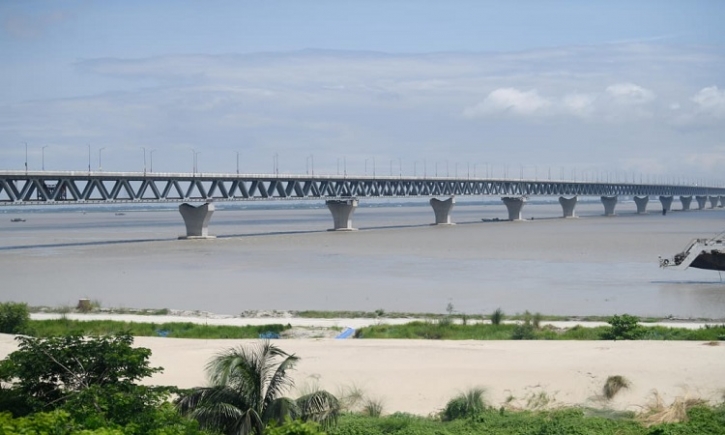Staff Correspondent
Published:2022-06-26 05:59:30 BdST
The Straits Times reports Padma bridge avoids pitfalls of external debt trap, regional rivalries
The Straits Times published a report on June 24 saying that Bangladesh will inaugurate a key bridge over the turbulent Padma river on June 25, more than two decades after work on it first started, during which time financial, political as well as technological hurdles had threatened its completion.
The unveiling of the bridge - Bangladesh's biggest infrastructure development project so far, that has been dubbed a "symbol of national pride" - marks a key milestone for the country.
But it also accentuates upcoming challenges for this South Asian country as it seeks to avoid debt-related risks and geopolitical rivalries associated with external borrowing and foreign collaboration necessary for Dhaka to complete other such high-profile projects.
While Dhaka engaged a Chinese firm to build the bridge, its construction - estimated to have cost around US$3.9 billion (S$5.4 billion) - was funded entirely by the Bangladesh government.
The decision to steer clear of foreign funds sourced bilaterally or from multilateral agencies was seen as a bold move, especially after the World Bank withdrew its financial support of around US$1.2 billion for the project in 2012 amid corruption allegations that were later dismissed in court.
Encouraged by its growing economy and foreign exchange reserves, the Bangladesh government also rebuffed Chinese and Malaysian proposals to fund the bridge's construction.
The 6.15km bridge, incorporating a four-lane highway on an upper level along with a single-track railway on the lower level, will accelerate Bangladesh's economic growth by boosting connectivity between its less-developed south-western region and the more developed parts that lie east of the river, including its capital Dhaka and the port city of Chittagong.
Dr Ashikur Rahman, a senior economist at the Policy Research Institute of Bangladesh, described the bridge's completion as a "big boost to state capacity".
"Prior to this, our bureaucracy never had the capability to execute such a mega project… The fact that we are finally at the end of the road underscores the long way we have come," he told The Straits Times.
But with other infrastructure development initiatives in the pipeline, including those under China's Belt and Road Initiative (BRI), certain experts have raised concerns about the viability of some projects involving significant external borrowing.
Such projects include the country's first nuclear power plant at Rooppur
being built at a cost of over US$12 billion, much of which is financed by Russia, and a high-speed rail link between Dhaka and Chittagong estimated to cost more than US$10 billion that China is keen to fund and build.
Noted Bangladeshi economist Professor Muinul Islam expressed concern about the viability of both these projects and described the former as the "worst kind of white elephant project" in an interview last month in the country's The Daily Star newspaper.
This comes at a time of troubling economic indicators such as the country's growing ratio of its external debt to its gross domestic product that has been rising since 2016; it increased to 21.8 per cent in 2021, up from 19.5 per cent in the previous year.
Rising import costs also saw the country's foreign reserves fall below US$42 billion in early May, the lowest in 18 months, before climbing up marginally later in the month.
Dr Rahman added that priority should be accorded to projects that enhance the productivity of local businesses and help the country’s export sector gain more global competitive edge, besides helping Bangladesh earn foreign revenue through measures such as tourism and boosting its energy security. “That is how we will make sure that we don't become Sri Lanka.”
However, it is not just debt traps that Dhaka must watch out for but also rivalry between its top trading partner China and its largest neighbour India, as well as the United States.
In May last year, China's envoy in Dhaka Li Jiming warned Bangladesh, which unlike India is part of the BRI and is the second-largest recipient of Chinese loans in South Asia under the initiative, against joining the Quad. The Quad, or Quadrilateral Security Dialogue, comprises Australia, the US, India and Japan.
He said doing so would "damage" bilateral relations, prompting a rejoinder from Dhaka stating it would "determine the course of its foreign policy in the interest of its people".
Even the Padma Bridge has become enmeshed in this power struggle, with Chinese state media attempting to claim it as part of the BRI, an assertion the Bangladeshi government dismissed earlier this week.
Dr Sujit Kumar Datta, the chairman of the Department of International Relations at the University of Chittagong, said Dhaka should avoid getting entangled in any military or strategic rivalry between China and India or the US.
"Bangladesh's involvement in the BRI should focus purely on our economic development," he told The Straits Times, adding that balancing competing power interests will become more challenging as rivalries become more entrenched.
“With Bangladesh’s economic status developing further, it is important our policymakers now emphasise on adopting an independent policy.”
Unauthorized use or reproduction of The Finance Today content for commercial purposes is strictly prohibited.


